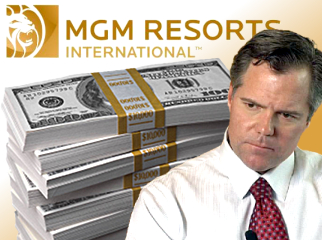 US casino operator MGM Resorts International posted a net loss of $93m in Q2 2013, improving on the $145.5m loss from the same period a year earlier. Revenue rose 6.8% to $2.48b but with $82m in impairment charges related to domestic property writedowns and $214.5m in interest charges on its long-term debt of $13.1b, actual profits will remain elusive for the foreseeable future. Nevertheless, MGM has managed to reduce its total debt by $476m so far this year and the company hopes to get its red ink down to a mere $10b or so within the next couple years.
US casino operator MGM Resorts International posted a net loss of $93m in Q2 2013, improving on the $145.5m loss from the same period a year earlier. Revenue rose 6.8% to $2.48b but with $82m in impairment charges related to domestic property writedowns and $214.5m in interest charges on its long-term debt of $13.1b, actual profits will remain elusive for the foreseeable future. Nevertheless, MGM has managed to reduce its total debt by $476m so far this year and the company hopes to get its red ink down to a mere $10b or so within the next couple years.
MGM’s stateside operations, which include 15 wholly owned properties in Nevada, Mississippi and Michigan plus three 50%-owned facilities in Nevada and Illinois, saw casino revenue rise 3%. Table games revenue rose 4% as hold increased from 17.7% to 18.1% and slots revenue rose 3%. Room revenue rose 5% as occupancy rose one point to 95%. Operating income at MGM’s wholly owned operations was up 12% to $239m. Earnings at MGM’s 10 operations on the Las Vegas Strip were up 15%, with casino revenue up 7% and room revenue up 5%.
MGM China, in which MGM Resorts holds a 51% stake (and Pansy Ho holds 27%), reported an 18% revenue rise to $835m, while earnings rose 10% to an all-time high of $205m and operating income rose to $126m from $90m in Q2 2012. Mass market table game turnover rose 11% while win rose 29%. VIP table turnover rose 34%, but hold fell from 3.3% to 2.9%. Slots handle was up 11% while win rose 4%.
ASIAN PLANS O’PLENTY
On a conference call with analysts, MGM CEO Jim Murren (pictured above right) said he was “very, very pleased with the progress” being made on MGM’s second casino in Macau. Murren revealed that the new MGM Cotai property would feature a mansion similar to the one in Las Vegas. Murren teased that if analysts were unfamiliar with the mansion alongside the MGM Grand, it’s “probably because you weren’t invited.” However, “it’s our most popular destination for our Asian customers,” and the Cotai version “will be really over the top.”
Murren also confirmed that MGM has been “very active in Japan,” where it has been “meeting with a lot of stakeholders there over the last few years and we are actively pursuing that.” Despite South Korea’s recent rejection of Caesars Entertainment’s gaming license application – allegedly because Caesars has even larger debt woes than MGM – and the even more recent implosion of the proposed EightCity project in Incheon, Murren claimed to be “engaged with the market there” and believes “the view is becoming more favorable.”
MGM STILL UNDERWHELMED BY NEVADA ONLINE PROSPECTS
As for MGM’s stateside online gambling prospects, Murren said MGM hadn’t given up hope on federal online poker regulation, “although it’s becoming very challenging there.” At the state level, COO Corey Sanders said MGM’s efforts to relicense itself as half-owner of Atlantic City’s Borgata operation were “underway” and “moving forward,” hopefully eliminating any hiccups that might prevent the launch of its online gambling joint venture with Borgata co-owner Boyd Gaming and Bwin.party digital entertainment when the New Jersey online market goes live in mid-November.
In Nevada, Murren said he understood that Caesars would be the next company to follow Ultimate Gaming into the intrastate online poker market and “we’re going to be following [Caesars].” In May, CFO Daniel D’Arrigo said the company was still assessing the viability of a Nevada-only operation, and Murren acknowledged on Tuesday that “there’s just not a lot of people” in Nevada to make the “standalone opportunity” that attractive. As such, Murren said MGM’s focus was on “Nevada’s ability to compact with other states to create more liquidity.” Murren said 2014 was a likely timetable for a compact between Nevada and New Jersey but Murren also claimed to have “a big team that is preparing ourselves on a state-by-state basis in the states that we believe would be the most productive for us,” such as California, New York and Illinois.
